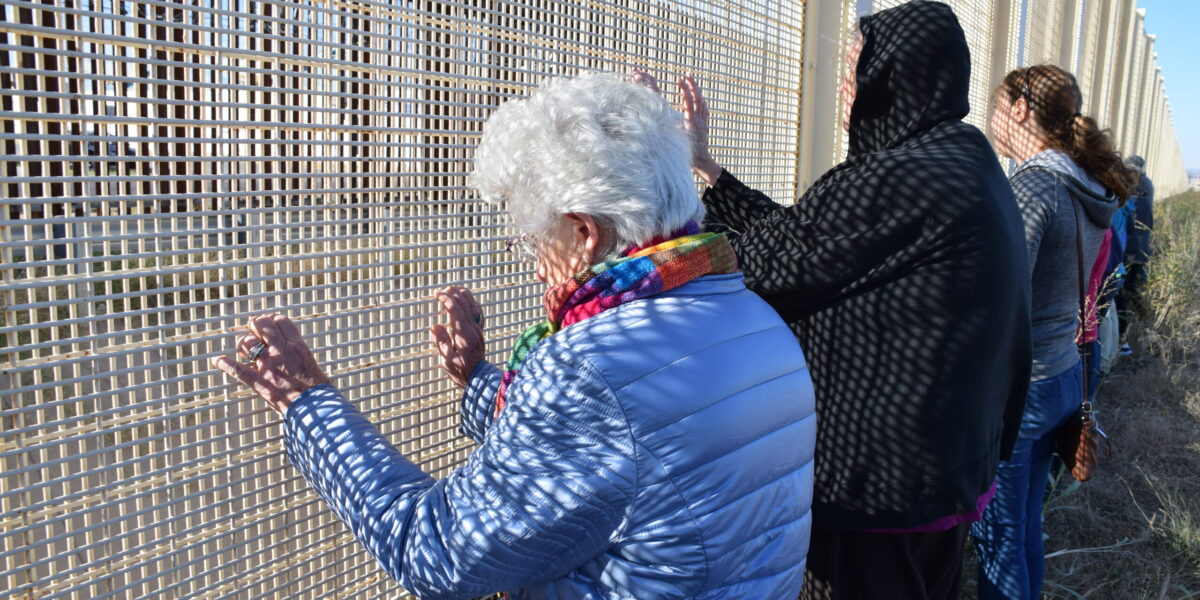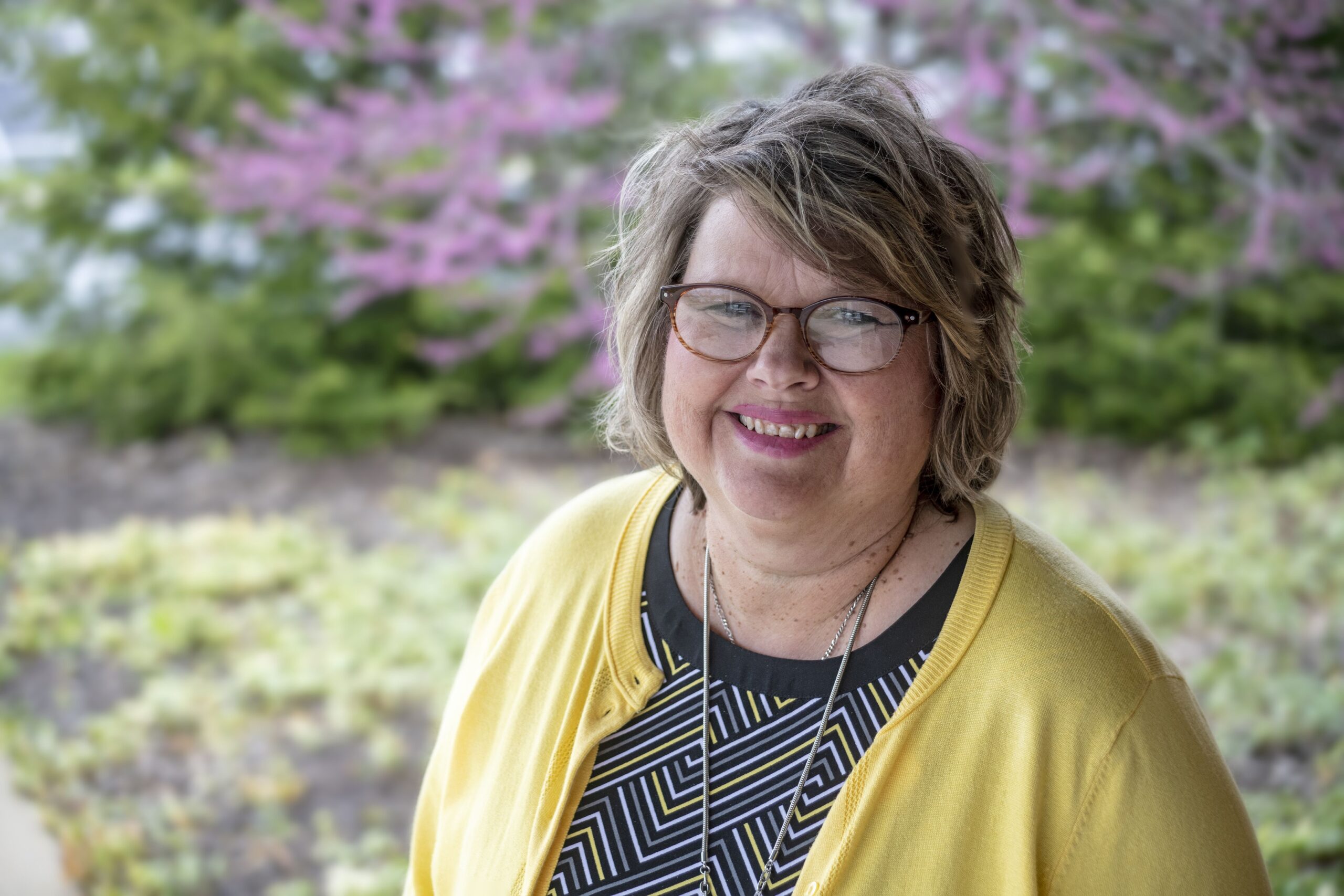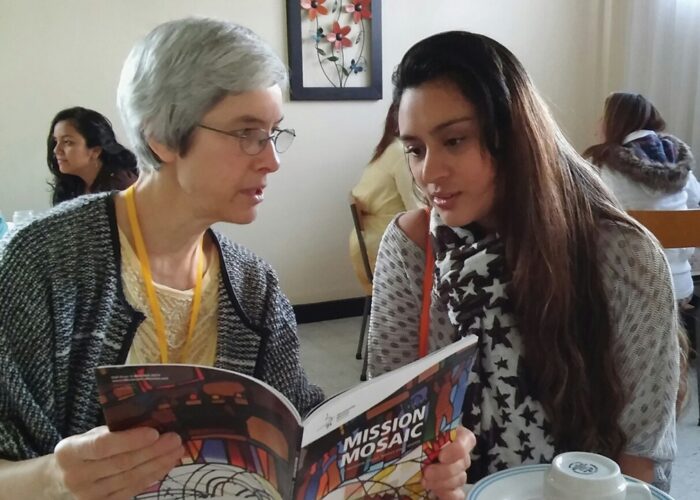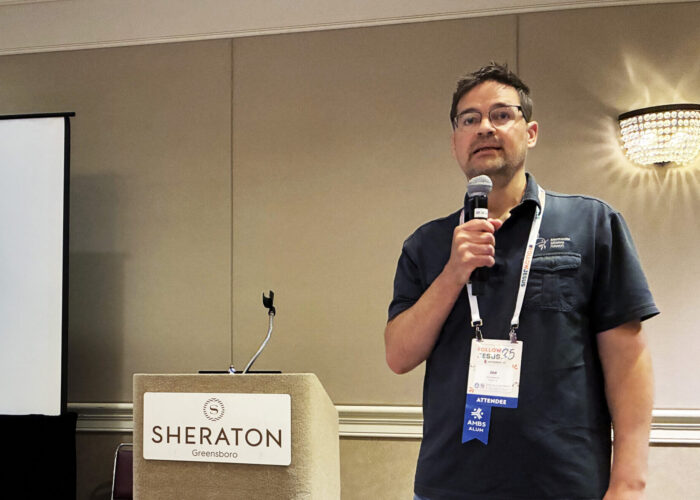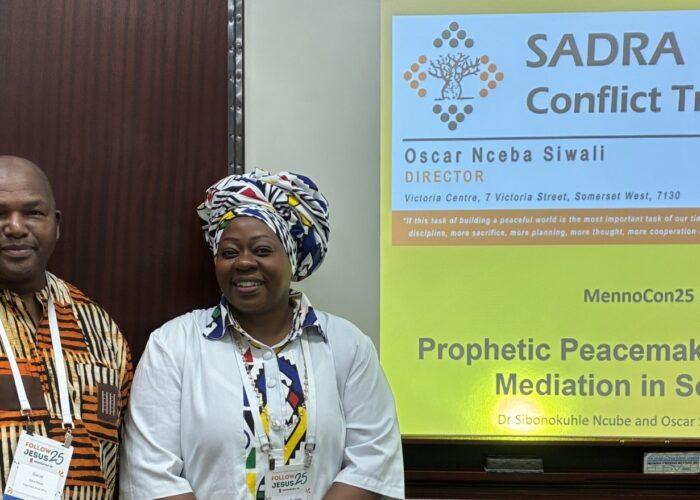NEWTON, Kansas (Mennonite Mission Network) — On a frigid early morning last November, participants of Mennonite Mission Network’s alumni service-learning tour struggled to pray through their lament and grief at a 15-foot-high border wall separating Douglas, Arizona, from Agua Prieta, Mexico.
Talks by Jack and Linda Knox, migrant advocates and members of Shalom Mennonite Fellowship in Tucson, Arizona, caused participants’ heads to bow under the weight of the reality of the wall.
Some participants peered through slivers of light in the barren immovable structure that symbolized the current U.S. immigration policies that are tightening borders and traumatizing migrants and asylum seekers from Mexico and Central America. Family separations, deaths in the desert, deportations, and increasingly longer and more convoluted paths toward legal U.S. status are the bitter fruits of these policies.
The slivers of light symbolized the faith of the group, seeking peace in pain. A communal prayer time, led by Jack Knox, followed by individual prayers, helped participants to find some buoyancy amidst their burdens, some of them said. Sparking hope were stories about migrants pressing forward against all odds — in conjunction with ministries providing aid and solidarity amidst a pain-filled perseverance.
"After being exposed to all this, I am experiencing renewed hope," said Linda Van Loon, a SOOP (Service Opportunities with our Partners) alumna of Pueblo, Colorado. "We have witnessed how there are so many persons, who, often in hidden ways, are finding ways to serve and to help those in need."
Judy Harder, a SOOP alumna from Hillsboro, Kansas, joined her in hope. "Those in the ‘trenches’ seem to be accompanying others with grace, humility, courage, wisdom, persistence and integrity."
Advocates in adversity
Accompanying the Knoxes in the "trenches" is Vicky Chaidez, office manager at Fontera de Cristo, the migrant resource center alongside the border in Agua Prieta. The center ministers to asylum seekers and deportees. Chaidez joined the group in the morning prayer time and in crossing the border to tour the center.
The center provides migrants with burritos, water, hot coffee, showers, basic medical care and children’s toys. Daily staff members and volunteers also accompany migrants to the border to inquire about whether their "number" has come up for entry into the United States. Out of hundreds of migrants waiting each day, less than a handful are admitted.
"The entry point at Aqua Prieta is the final step in the asylum seekers’ already very long journey before they begin the very long U.S. asylum process," Chaidez said. "Once they get across, they face the application process, a hearing, stays at detention centers, and fits and starts in connecting to sponsors."
Some migrants do not wait for this admittance, Jack Knox said. Instead, they "jump" the fence and attempt to walk through the desert into Tucson. They would rather risk dying from the dangers in the desert than risk deportation back to the violence and poverty of their homeland.
"We try to educate them about the dangers of the desert, including the fact that they will find very little water," Knox said. "Unless they find ranchers’ water tanks, they usually die."
Evening vigil honors those who die in the desert
Those who die in the desert have been honored with a vigil in Douglas every Tuesday evening for the past 20 years. Groups gather for the vigil that snakes along the Pan American Highway. The tour group joined this vigil. Participants carried crosses etched with the names of the deceased, and took turns shouting out the names before setting their crosses down on the sidewalk next to the highway.
The evening vigil, coupled with the early morning prayer, helped participants to enter the story of the migrants, rather than only hearing about their stories, said Keith Harder, a SOOP alum of Hillsboro.
"The vigil was striking, because it was one of the few occasions during which I could enact something," Harder said. "It gave us a way to flesh out what we were experiencing with a community of other people. … It was a living encounter — not something we were watching on television."
To meet migrants in person would have made the encounter even more powerful, Harder said. However, because the group was visiting the area on Veteran’s Day, a government holiday, detention centers were closed to tour visitors. In lieu of that direct exposure, Chaidez shared what migrants often tell her.
"A lot of the migrants say, ‘We don’t want people to think we were criminals. We are just seeking a better life,’" Chaidez said. "If we stay back there, our family members will be shot. Our fathers, our mothers, our children. We fear for our lives, so we migrate as entire families, to save our lives."
For a few reflective moments at the border wall, and in the resounding shouts of the vigil, the tour members joined the migrants in decrying policies that are provoking death rather than life.

